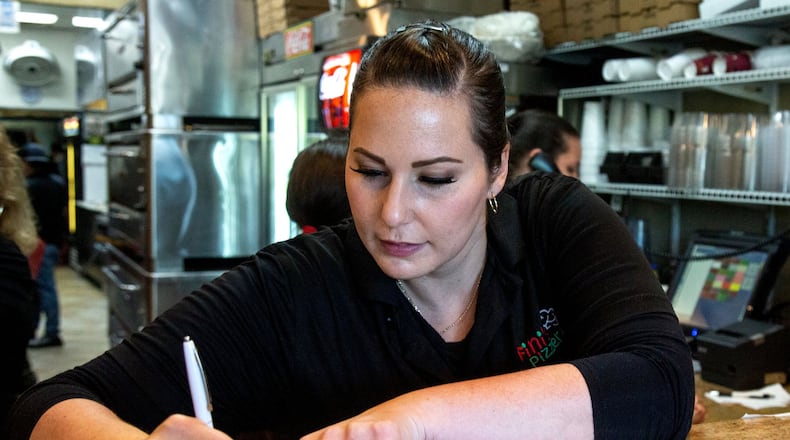For seven and a half hours, Joanna Fini hadn’t budged from a booth at her parents’ pizza parlor in a Lawrenceville strip shopping center.
Surrounded by mounds of printouts, a new four-in-one USB cable adapter kit, her laptop, tablet and long-since-emptied glass of cucumber water, she focused on what had sparked days of frustration: a small Wi-Fi-enabled printer.
She hoped it offered Fini’s Pizzeria a pinch of salvation from the coronavirus pandemic. If only it would allow Fini’s to take online orders for the first time in the pizzeria’s 17-year history. It’s one in a deluge of new stresses to keep the business afloat.
“I tell my husband, I can’t take a deep breath,” the 34-year-old Fini said.
In Lawrenceville and around the world, the coronavirus is threatening life-long dreams of millions of small business owners. Many are trying to recreate in days what was built over decades and generations.
Pizza might seem recession proof, maybe even made to order for a world where dine-in is banned and takeout and delivery are the only options for restaurants. But the pandemic has family-run Fini’s racing to compete with larger, tech-savvy rivals like Domino’s, Papa John’s and Pizza Hut that can handle a surge in online orders.
Before the coronavirus, life was busy enough at Fini’s Pizzeria, with 10 employees, 12 tables and a cramped shopping center space between a staffing company’s offices and a martial arts studio. Eighty percent of the pizza parlor’s sales were tied to dine-in customers. There were no online orders and no delivery.
Massimo Fini, Joanna’s father, left Italy when he was 10 and worked as a teen at one of his father’s pizza parlors in New York. Then he was a glazier installing windows on big buildings, sometimes high up on scaffolding, not always bothering to use a safety harness.
After moving to Atlanta, he and his wife, Gerri, decided to open their own pizzeria. He laid the bricks for accents inside the restaurant and worked on everything from the floor to the counters.
“I opened it on a credit card, and we did well from day one,” he said. “Paid it off the first year.”
It’s remained a family business. Joanna, the daughter, quit a pre-med program at the University of Georgia, got a business degree instead, and came back to help full time, convinced it was her duty. Her husband and her husband’s brother manage the kitchen.
The work seemed all consuming even before the coronavirus. Usually, Joanna handled payroll, accounting, marketing, technology, scheduling and re-making menus. Plus helping with food and supply orders.
Here’s what the pandemic added to her to-do list: Rearrange customer areas to increase social distancing. Launch online ordering. Market on Instagram. Figure out how to keep servers working without diners. Apply for small business loans and grants. Launch curbside pickup. Retrain staff on new systems. Shift menus daily to adapt to unusual new shortages like basil. Figure out new “shelter in place” regulations. Push the landlord for reduced rent or at least signs to mark curbside pickup areas.
It remains very much a work in progress.
Friday nights still busy; tackling long phone queue
The restaurant is at the quiet end of the strip mall, far from the Publix.
But signs on the wall boast about a string of “Best of Gwinnett” awards, and Fini’s has built a loyal following.
Customers say they have driven in from 20 minutes away, passing other pizza joints for what has become a dining ritual. Some are transplanted New Yorkers drawn by the family and food that reminds them of home — hand-tossed NY-style thin and Sicilian thick pizza.
“Every Friday, rain or shine. F in Fini’s reminds us of Friday,” said Michael Garry, an accountant who figures he’s been making the trek for 14 years.
Another customer, Maurice “Mo” Murry, in a mask and gloves, from Queens by way of Flowery Branch, belted out greetings to the crew on a recent night. “Even in a pandemic I need Fini’s pizza.”
Space inside the restaurant is tight. Head down the aisle in the dining area and there’s no chance for keeping a pandemic-certified six feet of separation. In parts of the kitchen, pizza makers work nearly back to back at opposite counters. Days after COVID-19 concerns soared, Joanna and her father set up shelving so patrons could collect their orders without getting close to workers.
Calls for takeout orders spiked after the dining room was shut down. A week later, Joanna planned to set up a phone menu to encourage callers to go online or push a number to speak to a person, so callers wouldn’t keep getting busy signals. But she couldn’t figure it out quickly. And within days it became less important as online orders surged.
Eventually, she launched curbside pickup for all online orders. Which caused its own ripple effects. She hired a couple young guys to run food out to patrons. Should she pay them straight wages or have them rely mostly on tips?
She created a separate phone line for curbside customers to call when they arrive at the pizzeria. Their calls become automated text responses that pop up on the restaurant’s iPad screen, naming the customer and describing their vehicle.
Delivery remains point of contention
Still, without dine-in customers, business is down 25% to 50%, depending on the day, Joanna said.
Headaches remain. There are daily and sometimes hourly scrambles to rejigger the changes. That printer she struggled to connect to the Wi-Fi to print orders for the kitchen? She eventually got it working. But a week later it cut out during a Friday night rush, backing up the kitchen for the rest of the evening. Orders also get misinterpreted as staffers try to learn the new system. She’s getting used to apologizing.
And pandemic or not, Joanna’s towering, snowy-haired father will not budge from his resistance to doing business with third-party deliverers. “I’m not going to pay 30% to them,” said the 60-year-old, donned in his best white chef’s outfit that difficult Friday night.
Massimo and Gerri also won’t have their own people deliver pizza. Do you know what that would do to their insurance costs?
“That’s not why we don’t deliver,” Gerri scolds her husband in the hard-tossed Yonkers, NY, accent they share. “We made a promise 17 years ago, we would never compromise our pizza.”
Tired, Joanna admitted she hates the demands of running a pizza parlor at times.
So much of her life is there, though.
Years ago, her landscaper brother told her dad about a Mexican day laborer he had hired who was the hardest worker he’d ever seen. Massimo hired him at the pizzeria. Given a chance to work as a dishwasher at Fini’s, Felix Acosta would ride his bicycle six miles each way, there and back, every day.
Eventually, Acosta became a pizza maker. And Joanna married him. She stuck with her maiden name, though, because of the restaurant.
She said she’d love to have kids, but that’s also not an easy decision. “How am I going to have time to have a family and run the restaurant?”
For now, her immediate concern is ensuring one pizzeria survives the pandemic.
“We are naturally frugal Italians. We grew up by not going out to eat, which is ironic. We can feed the whole family off of pasta. We have saved, but we are also stubborn. And we are not going to give up. And we are not going to walk away from this restaurant.”
About the Author
Keep Reading
The Latest
Featured








